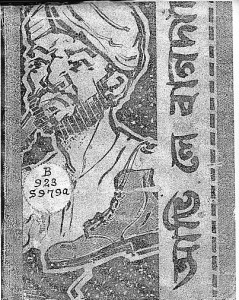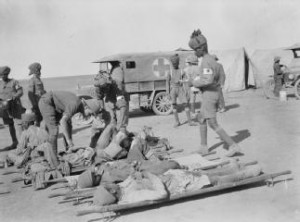Sisir Sarbadhikari’s Abhi Le Baghdad (On to Baghdad) is in my view, one of the most remarkable war memoirs of the 20th century.
In no small part does the book owe this to the diary on which it is based. This diary (in various iterations) accompanied Sarbadhikari through his travels around Mesopotamia, Syria, Turkey and the Levant. It went on many grueling marches with him hidden in his boots. He kept it with him even in prison camp, where its discovery could have resulted in disaster for him. That it survived the war is nothing short of a miracle.
Sarbadhikari explains the history of his journal quite late in the book, in a brief paragraph.
March 18, 1917
After this I couldn’t write in my journal for almost a year. In the first place opportunities were hard to find. Apart from that I had to tear up many of my notes for fear that they would be found; I re-wrote some of them later; but I couldn’t with some. You mustn’t make the mistake of thinking that the diary that I’ve referred to so far, and which I’ll refer to again, was my original diary. After the surrender at Kut, I ripped apart my diary, tore the pages into pieces, and stuffed them into my boots; using those scraps I filled out a new journal later – in Baghdad. This journal was also ruined when I crossed the Tigris on foot. But the writing wasn’t completely effaced because I had used a copying pencil. I dried the book and used it for my notes of the march from Samarra to Ras al-‘Ain. At Ras al-‘Ain I had to bury the diary for a while but it didn’t suffer much damage. In the infirmary at Aleppo I wrote it out again. (156-7)
These notes lend an extraordinary immediacy to On to Baghdad. Sarbadhikari’s descriptions of battles, forced marches and prison-camps are sometimes startlingly vivid. I know of nothing like it in Indian writing (although I have a feeling that a similar text may exist in Marathi, since many of the soldiers who fought in Mesopotamia were Marathas).
But it isn’t just the immediacy of the text that makes the book so remarkable: it is something about Sarbadhikari himself. Not only is he a fine observer, he is also to a quite remarkable degree, free of rancour and prejudice. Despite the horrors that he witnesses and experiences, he never loses his ability to perceive the humanity of others, ‘enemies’ and captors not excluded.
He evidently became quite fluent in Turkish and this gave him unusual insights into the lives of ordinary Turkish soldiers: he understood that many of them were worse off than the prisoners they were guarding. There is sometimes an almost ethnographic detachment in his writing. There is also something very winning about his lack of grandiosity and pretension: never does he try to ‘come the old soldier’ – the whole book is pervaded by a kind of ingenuousness.
These qualities are unusual in any depiction of war, but they are particularly so perhaps in memoirs of the First World War. For this was a time when writers, sometimes even very gifted writers, had difficulty in recognizing the humanity of people outside their own class, let alone those of other races, religions and nations.
The quirky appeal of Sarbadhikari’s sensibility is evident in his choice of title. Here is how he explains it:
Major-General Charles Townshend, the Commanding Officer of the 6th Poona Division, said in his Order of the Day of November 3, 1915, ‘we have successfully taken Sahil, Qurna, Kut al-Amara and other such places so our aim now is to move on to Baghdad’. We all assumed that Baghdad would be easily taken; that any other result might be possible never so much as entered our minds. In many units, British officers began to say that they would celebrate Christmas 1915 in Baghdad.
But instead of taking Baghdad we were forced to retrace our steps and retreat. After Umm al-Taboul there was a rearguard action and we had to go on marching, without once halting for a rest. Marching beside me was a Muslim sepoy of the 66th Punjabis: he had taken his boots off his feet, and tied them together by their laces; with his rifle in hand he was limping along and saying to himself ‘Ya Allah, abhi le Baghdad’, meaning by this: ‘’On to Baghdad’ you said; now enjoy this.



eagerly awaiting the book. If you say that Sarbadhikari was “free of rancour and prejudice” i am sure your book will excel in that for you have been extremely poised in your comments and juxtapositions of facts all throughout your books where you could have easily crossed a line – and its so easy to do so without even knowing…
It is indeed a miracle that such text was written… and its a bigger miracle that we have someone like you re-creating the events in your own unique way and presenting it to an indian diaspora – and much more to a world who has yet to dwell on the complexity that is india…
Thank you very much!
best
Amitav
I concur with your previous commentator. This is fascinating history and the verbatim report is a treasure that you have unravelled. I am looking forward to your next book.
Dear Mr.Ghosh:
I accidentally came across your blog yesterday on FB, and have been enjoying, first about Maulana Bhashani, and now this, “Abhi Le Baghdad”. I would love to read the original also. Talking of six degrees of separation, one of my father’s paternal uncles was in Mesopotamia during the WWI, fighting for the British. And in WWII, one of father’s elder brothers was in Manipur as a Commandant of the Refugee camp, and their eldest brother had come from Burma as a refugee. And one of their cousins, who was a Doctor, had spent 7-8 years as POW in a Japanese Camp. We are Assamese. Waiting to read the full book in both English and Bengali.
Regards,
Syeda Jebeen S. Shah
Enjoyed this amazingly detailed and human account of the rigours of the Mesopotamian campaign from a distinctive perspective. Im working on a book on ‘Nepal, the Gurkhas and the Great War’ and will undoubtedly draw on this, as the Gurkhas shared the story with the other units of the Indian Army in this campaign (as in others). Full acknowledgements will be provided..
david seddon
Thank you – I very much appreciate it.
best
Amitav
Amitav,
I am a grandson of Dr. Suresh Prasad Sarbadhikari (daughter’s son). Dr. Suresh had organized the Bengal Ambulance Corps that served excellently in Mesopotamia. However, I did not know that I had a distant relative on my mother’s side, Sisir Sarbadhikari, who not only served there but also wrote such an excellent account of the war.
I am trying to figure out how he was related to Dr. Suresh. Do you have any information about the names of Sisir’s father, grandfather, or brothers?
I appreciate your help.
Dear Hem Chaudhuri
I am very glad to hear from a relative of Sisir Sarbadhikari. I’m afraid I do not know anything about the family. However, I do know that Dr Santanu Das has been in touch with them. I will pass on your letter and email address to him.
best wishes
Amitav Ghosh
Dear Amitav,
Thank you very much for posting these translated excerpts from Sisir Sarbadhikari’s diary. I am currently making an exhibition in London about the voices and experiences of South Asian soldiers in the First World War as part of a volunteer project, and would love to focus on his diary, especially as it is the only example I can find of a completely unmediated, ‘straight-from’-the-horse’s-mouth’ account from a South Asian individual.
Do you have further excerpts of this diary in translation which you would be happy to share? I have not been able to track down any original or translated text available in the UK.
Best wishes,
Eleanor